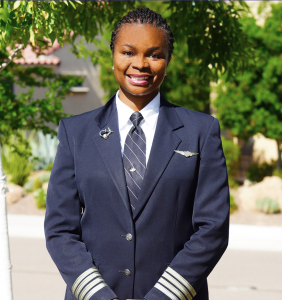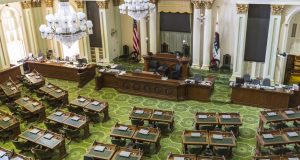By Jason Douglas
FedEx Airbus Captain and Line Check Airman Tahirah Lamont Brown recalls her very first time in the cockpit in 1992—a momentous occasion for any pilot, but especially for an African American woman entering an industry dominated by men. Brown later became the first African American woman pilot for FedEx, and shares how hard work, creativity, determination and mentors helped her build her “office in the sky.”
When did you decide you wanted to be a pilot, and what about flying intrigued you?
I decided to be a pilot in high school. At that time I had only flown twice in my life, but the more I learned about aviation, the more fascinated I became. I enjoy traveling, meeting new people and learning about different cultures. Aviation matched my personality. It was an epiphany for me. I decided this is what I want to do, and God put people in my path along the way that helped me achieve my goal.
How did your parents react when you told them about your plans?
My mother was nervous. My father was supportive, but wasn’t sure I was serious.
There were barriers, for sure. I didn’t know any pilots and didn’t know how to pay for flight school.
I worked two jobs to pay for college and for flight training. I also wrote my family a letter asking them for support. I promised that if they would help me now, I would pay them back when I had the money, and they helped me.
I met Bill Norwood, the first black pilot at United Airlines, while in Tuskegee, Alabama, at Operation Skyhook and he introduced me to OBAP, the Organization of Black Aerospace Professionals. That introduction provided me with the guidance I needed, and also helped me with scholarships for flight training.
Describe your first flight and how it made you feel.
I still remember it vividly as it was exhilarating. I was twenty years old. My first flight was in a Cessna 172, a four-seat single engine prop plane. My instructor in college was with me, along with my supportive, yet reluctant father in the backseat. We took off out of Long Island and flew to Greenwich, Connecticut. I was on top of the world. I could not believe that my view was the sky.
We flew around as I tried to maintain wing level. I looked back at my dad and he was giving me the thumbs up, but I could tell he was getting a little queasy. I said: “you’re doubting me, right?” When we landed I felt like a child that was taking her first step–like the world had no limits. My father told me this was what I was meant to do. All his doubts were alleviated at that moment and going forward he only asked how he could help me.
How and when did you get to FedEx, and what was your career path?
While studying for my degree in aviation business management, one of my professors Ray Marshall, a retired Eastern Airlines pilot, made me a deal.
If I would babysit his son and pay for airplane fuel, he would provide the flight instruction I needed. That was the start of my career in aviation.
Ray helped me get my private pilot’s license. From there, OBAP helped me get an opportunity through their Professional Pilot Development program.
A flight school was just opening, so I approached the owner of the school. I explained I was a hard worker, and looking to complete my instruments license while seeking a scholarship from OBAP. If he would give me an opportunity, he would not be disappointed. I answered phones, I would clean, whatever was needed. And they gave me a chance.
I taught as a flight instructor for two years, later joining Great Lakes Airlines (United Express) as a pilot. While attending Women in Aviation and OBAP conferences I would often speak with FedEx representatives, including pilot recruiter Beverly Hyter. Beverly played a pivotal role in my decision to join FedEx. I joined the company in 2002 as the first African American female pilot.
Are you involved with OBAP today and what is their mission?
I have been an active member of OBAP since 1992. OBAP provides a means of mentorship and encouragement, to help minorities achieve their dreams. The encouragement comes from seeing people like you who have achieved.
Was there a moment when you felt like you had really made it in the industry?
While I feel like I’ve accomplished a lot, I will not feel like I’ve made it until I see more minorities in the industry. When I speak at conferences, I help provide information about FedEx and encourage minorities to apply. However, I have not seen a significant change.
What is the role of a Line Check Airman?
I became a Line Check Airman in September 2017. A Line Check Airmen is a dual role position, an instructor and an evaluator. We’re selected and trained by FedEx Express and designated by the FAA to train, evaluate and certify the competency of FedEx pilots. With respect to knowledge, skill and proficiency.
What do you say to young people, especially girls who are interested in flying?
I tell them my life story, and that the end result and sacrifices are going to be worth it. You have to make sacrifices, and the road is going to be hard. I let them know that I am here to support them, to give them advice and to listen to them, because that was important to me. But, they will have to find it within themselves to know that it is achievable.
I also tell young people to not allow negative attitudes to affect you. This has been true for me. We can be our biggest barriers at times. We have to overcome our own personal barriers to achieve our goals.
 Westside Story Newspaper – Online The News of The Empire – Sharing the Quest for Excellence
Westside Story Newspaper – Online The News of The Empire – Sharing the Quest for Excellence




